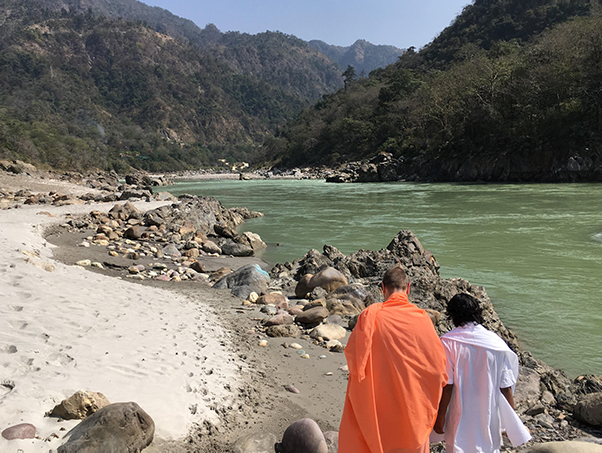These Satsangs are coordinated by the Ashram Team and ‘Les Amis d’Ajatananda Ashram’, in partnership with Eveil Conscience, and will take place in French, with simultaneous translation into English. You will therefore be able to listen and see Swamiji in full screen and follow his teaching which will be based on a text from the Advaita tradition and followed, as in every Satsang, by a question and answer session.
Please note! In order to participate, your registration is mandatory. Please click on the ‘Register Here’ button below the description of the event to access the registration form.
To support the teaching of Swamiji and the Ajatananda Ashram, we will maintain the principle of conscious donation. If you wish to do so, you will be able to make your donation at the time of your registration.
The Zoom link, guidelines for the meeting and the text that will be commented on by Swamiji will be sent to you the day before the event. We suggest you either print the text or display it on an additional device during the Satsangs.
We invite you to keep your camera on and display your first and last name as your username for the duration of each Satsang as a sign of your full participation. Please kindly read our Additional Guidelines here.
If it is impossible for you to attend any of these Satsangs due to your professional obligations or time zone differences, please feel free to to contact us by following this link. We will do our best to offer you an alternative option.
CLOSE THE WINDOW
These online Satsangs are coordinated by the Ashram Team and ‘Les Amis d’Ajatananda Ashram’, and will take place in English, with simultaneous translation into French. You will therefore be able to listen and see Swamiji in full screen and follow his teaching which will be based on a text from the Advaita tradition and followed, as in every Satsang, by a question and answer session.
Please note! In order to participate, your registration is mandatory. Please click on the ‘Register Here’ button below the description of the event to access the registration form.
To support the teaching of Swamiji and the Ajatananda Ashram, we will maintain the principle of conscious donation. If you wish to do so, you will be able to make your donation at the time of your registration.
The Zoom link, guidelines for the meeting and the text that will be commented on by Swamiji will be sent to you the day before the event. We suggest you either print the text or display it on an additional device during the Satsangs.
We invite you to keep your camera on and display your first and last name as your username for the duration of each Satsang as a sign of your full participation. Please kindly read our Additional Guidelines here.
If it is impossible for you to attend any of these Satsangs due to your professional obligations or time zone differences, please feel free to contact us by following this link. We will do our best to offer you an alternative option.
CLOSE THE WINDOW
Subscribe to our newsletter
[mc4wp_form id=”9308″]



